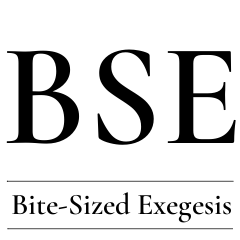While the traditional reading of John 1:3-4 divides the sentences between the verses, there is some text-critical evidence that the perhaps the period should come before the last couple of words of verse 3. Which one is the correct reading, and how can we know?
Category Archives: biblical scholarship
May Your Children Be Like Isaac: Reading Isaac on the Autistic Spectrum
Isaac’s behavior and characterization in Genesis has long struck commentators as odd for his passivity, repetitiveness, and imitativeness of his father Abraham. Interestingly, much of the peculiarity of Isaac’s behavior fits the profile of a high functioning autistic individual.
Studying the Bible: To Love It is To Know It
To really know someone or something one must first love that someone or something. This applies both to human relationships and to Bible study.
Q&A – Why Do Some Christians Have Longer/Shorter Bibles?
Question: AH! I just discovered that some Christian groups have more/fewer books in their Bible, and now I’m afraid I can’t believe anything anymore! What do I do? Short Answer: DON’T PANIC! We all agree about the New Testament. In the Old Testament … it’s complicated, but the positions are all reasonable.
Q&A – Are the Nephilim the Basis for the Hercules Stories?
Are the Nephilim of Genesis 6 the Basis for the Greek Legends of Hercules? First, we have to examine this question and see if it is asking the right thing. Second, we need to consider what Genesis is trying to accomplish in chapter 6.
Q&A – Was Thutmose III the Pharaoh of the Exodus?
Was Thutmose III the Pharaoh of the Exodus? Possibly. This article offers some evidence for and against this relatively early dating of the Exodus.
Q&A – Are Imhotep and Joseph the Same Person?
Are Imhotep (a vizier under Pharaoh Djoser) and Joseph (from the book of Genesis) the same person? Certainly not, and here’s why.
Close Reading: Reading From Different Perspectives
It is possible to read a text from a perspective that seems unnatural to the text. In doing so what we actually do is critique ourselves as readers and force ourselves to see new things in the text. There are productive and unproductive ways to do this, but it can be useful for Bible study.
Reading Amos 2:4-5 in Context
The oracle against Judah in Amos 2:4-5 is typically regarded by scholars as a later insertion due to its use of Deuteronomic language and the apparent vagueness of its accusation. This article argues that dating a text late solely because of the presence of so-called “Deuteronomic” language is logically circular, and it proposes a reading of the first two chapters of Amos that makes the oracle against Judah an integral part of the passage’s rhetoric rather than an obligatory insertion.
The Authenticity of Amos 1:9-12
Many biblical scholars doubt the authenticity of the oracles against Tyre and Edom in Amos 1:9-12. But not only do many of the arguments against their authenticity have other, better explanations, some, particularly those that argue for a much later date of the Edom oracle based upon its “appropriateness”, commit a fundamental error in logic.


